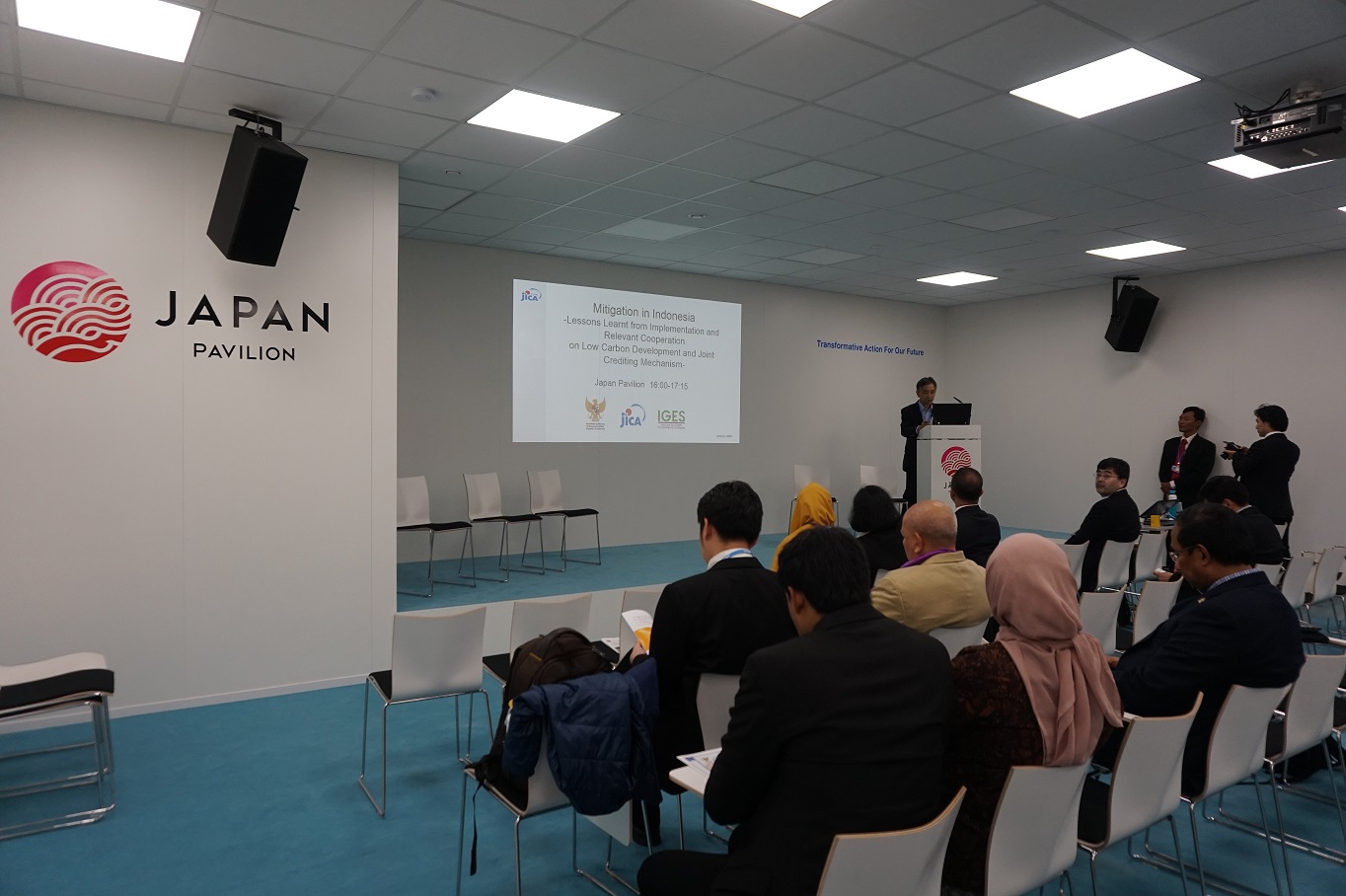
16:00 - 17:15
| Event title | Mitigation in Indonesia – Lesson Learnt from Implementation and Relevant Cooperation on Low Carbon Development and Joint Crediting Mechanism |
|---|---|
| Contents | This session aims to share the latest development and overview of mitigation policies and measures, including JCM implementation in Indonesia, and outputs of JICA cooperation which has been conducting in order to promote low carbon development and operationalize JCM implementation in Indonesia. After adoption of Paris Agreement, developing countries have responsibility to develop and implement their national determined contribution (NDC). Some policy issues identified through the cooperation are to be discussed: i.e. integration of policy measures (including JCM and other approaches/mechanism) with the context of national climate change policies and NDC implementation strategies as well as streamlining sectoral policies. The session will be expected to contribute to further developing mitigation action in developing countries as well as negotiation of Article 6-related issues through presenting common challenge and lessons learnt. |
| Keywords |
|
| Speakers Name and Title |
|
| Organiser / Co-organiser |
|
Opening Remarks (10 min)
Introduction (5 min):
Presentations (30 min, 10 min * 3 presentations):
NDC implementation in Energy Sector
Progress of Joint Crediting Mechanism (JCM) in Indonesia
Lessons learnt from JICA Cooperation on Low Carbon Development
Discussions (30min): Moderator Ms. Cahyadi Yudodahono, Head of Financial Cooperation, Coordinating Ministry for Economic Affairs in Indonesia
Closing Remarks (5 min)
This event was aimed at introducing progress of climate change mitigation policies and JCM in Indonesia and sharing the lessons learned.
First, Coordinating Ministry for Economic Affairs shared overview of climate change mitigation policies and JCM cooperation in Indonesia (Mr. Edwin). JICA presented priority issues of JICA’s cooperation to tackle with climate change and overview of its climate change cooperation in Indonesia (Mr. Shigiya).
Then, three presenters shared following points. (1) Energy sector plays crucial role (38% reduction from the national target) in NDC In Indonesia. Promotion of renewable energy and energy conservation is crucial. Polices and measures have been developed by Ministry of Energy and Mineral Resources (Ms. Ida). (2) In Indonesia, development of JCM rules and guidelines has progressed. Various guidelines (including planning and monitoring system on sustainable development), and 12 methodologies have been approved. JCM city to city cooperation is expanding further to JCM project development and implementation (Mr. Dicky). (3) JICA has been conducted technical cooperation on capacity development for low carbon development and JCM since 2014. It has supported institutional development on JCM, awareness raising activities on JCM and low carbon related policy assessment. Challenges for further expansion of JCM are to enhance climate policy in integrated and coordinated manners as well as address barriers identified such as financing and regulatory barriers (Mr. Ichihara).
In the discussion session, it was shared that JCM implementation in Thailand is active (Mr. Thawatchai). Also, benefits as well as challenges of JCM implementation, status on JCM in related to article 6 of Paris Agreement and carbon price (on JCM) were argued. Then, IGES delivered closing remarks by sharing lessons from IGES operation in Indonesia (Mr. Takeuchi).
In Indonesia, climate change mitigation policies and measures are progressing yet there are various challenges to smooth implementation of mitigation actions and JCM (especially, for private sector involvement); harmonizing among JCM, climate policy (including sectoral policies) and NDC, improving policy coordination among stakeholders and addressing regulatory and financing issues/barriers.
Further involvement of related stakeholders such as financing sector and local governments with awareness raising and capacity building is crucial. In addition, it is important to mutually learn from the related efforts of relevant stakeholders (among relevant countries).
Jun Ichihara, Japan International Cooperation Agency(JICA)

Copyright Ministry of the Environment Government of Japan. All rights reserved